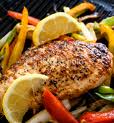
Ready-to-drink shakes and giant tubs of protein powder seem to be dominating the supplement market these days. But should you be using these products? The purpose of this post is to review some of the pros and cons of these supplements, so that you can make an informed decision about whether or not they are right for you.
First, let’s talk about protein’s role in health. Protein is essential for a number of functions in the body, including building and repairing muscles and other tissues. Protein is typically not used as energy sources during exercise and physical activity. Carbohydrates and fat are our main sources of energy. Protein is found in both plant and animal foods. Sources of protein include meats, dairy products like milk and yogurt, whole grain products, nuts, and beans and legumes. All sources of protein are not created equally. Animal sources of protein are considered high-quality or complete proteins because they contain all the essential amino acids (the building blocks of protein). Plant-based proteins are typically missing one or two amino acids and need to be mixed (think beans and rice) in order to get a complete source of protein.
The average individual needs 0.8 grams of protein per kilogram. To figure out your needs, divide your weight in pounds by 2.2 to get your weight in kilograms. Then multiply by 0.8.
Example: 160 pounds/ 2.2 = 72.7 kilogram x 0.8 gram = approximately 59 grams of protein needed.
To but this in perspective, a 3 oz. chicken breast has about 20 grams of protein. This is also the average amount of protein in a scoop of protein powder. According to the Academy of Nutrition and Dietetics, if you are eating a variety of foods with enough calories to maintain your weight and keep your energy up during workouts, protein supplements aren’t necessary. It is entirely possible to get the protein you need through your diet. If you are looking to build muscle, you don’t need to pile on the protein, either. You may need to increase your protein intake slightly. It is recommended that strength athletes eat 1.2 -1.7 grams of protein per kilogram. Most of us aren’t training for World’s Strongest Man or Woman so our needs are not this high. It is important to realize that just eating more protein alone won’t help you put on muscle; you have eat enough calories as well. Extreme high protein intake can be harmful to your liver, kidneys, and heart, so it’s very important to discuss your needs and intake with your physician or dietitian.
|
Pros |
Cons |
| Provide high quality, easily digested protein | Expensive ($30-$100 or more!) |
| The ready-made –shakes can be an appropriate meal replacement or snack if you’re short on time and if they provide other necessary nutrients | Typically contain the same amount of protein as regular food sources. |
| May be a good idea for vegetarians or vegans, who can have trouble getting enough high-quality protein from plant-based sources. | Do not always contain the nutrients found in food, so you may be missing out on other important nutrients. |
| Flavor (now this is a personal factor but what if you spend $40 and you hate the way it tastes? |
References
American Dietetic Association. (2009). Position of the American Dietetic Association, Dietitians of Canada and the American College of Sports Medicine: Nutrition and athletic performance. Journal of the American Dietetic Association, 109(3), 509-527.
Academy of Nutrition and Dietetics (2012). Do I need protein drinks if I am working out? Nutrition Q and A.
-Written by Chelsea Rambo, MS–USD Dietetic Intern

